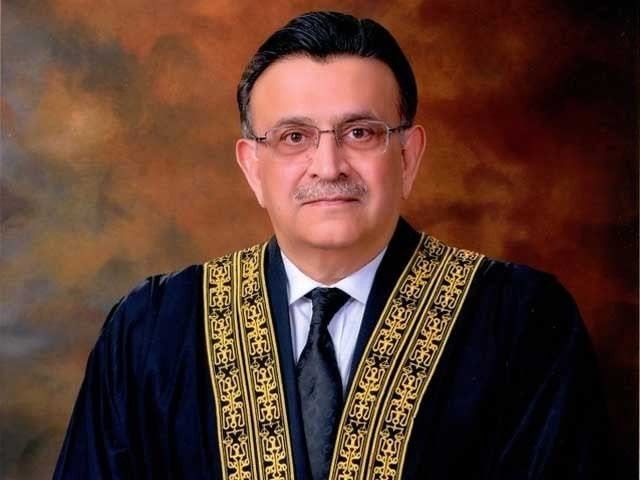Only courts mandated to give ruling on Article 62(1)(f), says CJP
Vawda's US citizenship had not been cancelled at the time of filing the affidavit, observes Justice Ayesha

Chief Justice of Pakistan Umar Ata Bandial said on Thursday that the declaration of Article 62(1)(f), which holds the ultimate punishment of lifetime disqualification of lawmakers, can only be given by the court.
The chief justice observed that no one can be declared dishonest without examining the evidence, and added that “it is not so easy to disqualify someone for life”.
The CJ made the remarks while hearing a petition filed by Pakistan Tehreek-e-Insaf leader Faisal Vawda challenging his lifelong disqualification by the Election Commission of Pakistan (ECP) and the subsequent ruling by the Islamabad High Court (IHC).
“Judicial declaration means recording of evidence. The Supreme Court (SC) in its judgments has set criteria for the application of Article 62(1)(f),” observed the CJ.
A three-member bench of the apex court, headed by the chief justice, comprising Justice Ayesha Malik and Justice Mansoor Ali Shah heard the case.
Read: Lifetime disqualification: Top judge’s observation triggers debate
Justice Bandial further stated that Faisal Vawda had renounced his US citizenship after submitting his nomination papers to the ECP.
“In the present case, the debate should be whether the disqualification is limited to contesting elections or for life,” stated the chief justice.
During the proceedings today, Vawda’s lawyer Waseem Sajjad argued that the former senator neither hid facts nor did anything in bad faith.
“When did Faisal Vawda submit his nomination papers?” asked Justice Shah.
The lawyer informed the court that the PTI leader submitted his nomination papers on June 7, 2018, and scrutiny took place on June 18.
Justice Mansoor further asked, “When did Faisal Vawda submit the affidavit?”
“Vawda submitted the affidavit on June 11, 2018. The returning officer was also told that he had given up his US nationality. Vawda went to the US Embassy and stated that he is giving up his nationality,” Sajjad told the court.
He further added that the PTI leader also got his National Identity Card for Overseas Pakistanis (NICOP) cancelled.
Questioning the lawyer, Justice Shah asked, “Did you go to the embassy and verbally tell them to cancel the passport?”
“He didn't have to give the proof of cancelling the nationality,” answered the lawyer.
Also read: Vawda disqualified for life in dual nationality case
“You did not bother to clear the issue of dual citizenship before submitting your affidavit on June 11?” asked Justice Shah further.
The PTI leader’s lawyer stated that NADRA issued a certificate of cancellation of US citizenship on May 29, 2018.
Justice Ayesha maintained that Vawda's US citizenship had not been cancelled at the time of filing the affidavit.
Vawda’s lawyer told the court that the real question is the declaration of life-long disqualification which the commission cannot grant.
“Article 63(1)(c) applies to dual citizenship. A member on dual citizenship is only de-seated, not disqualified for life,” the lawyer prayed to the court.
The court adjourned further hearing of the case till October 12.
‘Draconian' constitutional provision
Earlier this week, the CJP termed Article 62(1)(f) a 'draconian' constitutional provision.
He made the remarks while hearing a petition filed by Vawda challenging his lifelong disqualification.
During the proceedings, CJ Bandial observed that “Article 62(1)(f) is a draconian provision”, and added that “this case will be heard with utmost care”.
“Vawda had contested elections in 2018 and two years later a disqualification petition was filed in the high court for submitting a false affidavit,” argued Vawda’s lawyer Waseem Sajjad.
However, the court observed that the ECP retained the right to investigate a false affidavit.



1724319076-0/Untitled-design-(5)1724319076-0-208x130.webp)















COMMENTS
Comments are moderated and generally will be posted if they are on-topic and not abusive.
For more information, please see our Comments FAQ